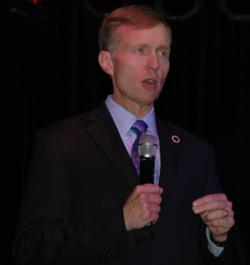MARYSVILLE — Washington state Attorney General Rob McKenna wanted the Greater Marysville Tulalip Chamber of Commerce to know that he’s touted their communities as a success story to other state organizations, even as he acknowledged that the state government needs to step up parts of its service to citizens of Marysville, Tulalip and beyond.
McKenna opened his remarks at the Chamber’s July 29 Business Before Hours by describing Silicon Energy, which he visited with city of Marysville officials on May 11, as one of the companies that “wants to be in Marysville,” due to the city’s business-friendly climate. He likewise praised the Marysville Arts & Technology High School as an example of the “innovation in education” that he sees being done by the Marysville School District.
“Not everyone in the state is as effective as Marysville, though,” McKenna said. “We have a statewide achievement gap that’s unacceptable. By current estimates, it’d take us 105 years to close it.”
At the same time that McKenna objected to the shrinking percentage of state funding that’s devoted to education, he cited the accomplishments of Washington educators by noting that the state of Louisiana and the New York public schools have hired experts from the University of Washington to address their own achievement gaps.
Moving on to what the state government has accomplished for its citizens, McKenna touted 44 bills that the state Legislature passed, which were written by his office, covering areas ranging from consumer protection to public safety. He explained that inmates who file more than three suits deemed “frivolous” in state courts will be forced to pay their own filing fees on future suits, and added that prosecutors have been given greater incentives to pursue identity theft cases, which constitutes “the number one consumer protection claim” in the state.
“Get locking mailboxes,” McKenna said. “When you have a traditional mailbox with a flag that goes up, that’s like waving, ‘Hello Mister Meth Addict, come steal my mail.'”
McKenna attributed a significant portion of identity theft to meth addicts stealing mail, but also pointed out that prescription drug abuse has eclipsed methamphetamine use in the state.
“Prescription drugs don’t scare kids the same way that meth does,” McKenna said. “At its peak, 2 percent of our high school students used meth. Now, 20 percent of those high school students are using prescription drugs to get high.”
McKenna has worked to create a prescription drug monitoring board, to prevent drug abusers from simply picking up mass quantities of prescription drugs at multiple pharmacies. When asked about marijuana dispensaries, an issue that’s become relevant to Marysville within recent months, McKenna did not object to medicinal marijuana, so long as it was effectively regulated, but he warned against any non-medicinal use.
“Marijuana is much more powerful than it was decades ago,” McKenna said. “The last thing we should do is encourage the use of such a mind-altering substance.”
McKenna also explained why Washington has joined 25 other states in challenging the health care legislation passed under the Obama administration.
“The insurance mandate is the federal government telling citizens that they’re required to buy something from a private company,” McKenna said. “Employers will be faced with paying for health care coverage that they don’t need. The federal government has some powers, while the states reserve the rest. If we want to change that, we need to amend the Constitution.”
McKenna expects the suit will reach the Supreme Court by 2012 or 2013.



